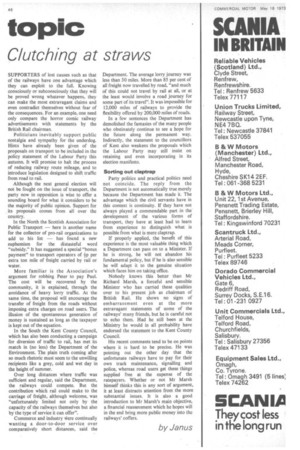topic
Page 48

If you've noticed an error in this article please click here to report it so we can fix it.
Clutching at straws
SUPPORTERS of lost causes such as that of the railways have one advantage which they can exploit to the full. Knowing consciously or subconsciously that they will be proved wrong whatever happens, they can make the most extravagant claims and even contradict themselves without fear of the consequences. For an example, one need only compare the horror comic railway advertisements with statements by the British Rail chairman.
Politicians inevitably support public nostalgia and sympathy for the underdog. Hints have already been given of the proposals on transport to be included in the policy statement of the Labour Party this autumn. It will promise to halt the process of reducing railway route mileage, and to introduce legislation designed to shift traffic from road to rail.
Although the next general election will not be fought on the issue of transport, the party now in opposition is wise to offer a sounding board for what it considers to be the majority of public opinion. Support for its proposals comes from all over the country.
In the North the Scottish Association for Public Transport — here is another name for the collector of pro-rail organizations to add to his list — has found a new euphemism for the distasteful word "subsidy." It has suggested a special "bonus payment" to transport operators of fp per extra ton mile of freight carried by rail or water.
More familiar is the Association's argument for robbing Peter to pay Paul. The cost will be recovered by the community, it is explained, through the avoidance of heavy lorry traffic. At the same time, the proposal will encourage the transfer of freight from the roads without imposing extra charges on road users. The illusion of the spontaneous generation of money is sustained as long as the taxpayer is kept out of the equation.
In the South the Kent County Council, which has also been conducting a campaign for diversion of traffic to rail, has met its match in (no less) the Department of the Environment. The plain truth coming after so much rhetoric must seem to the unwilling recipients like a grey, cold and wet day in the height of summer.
Over long distances where traffic was sufficient and regular, said the Department, the railways could compete. But the contribution which rail could make to the carriage of freight, although welcome, was "unfortunately limited not only by the capacity of the railways themselves but also by the type of service it can offer".
Commerce and industry '('ere continually wanting a door-to-door service over comparatively short distances, said the Department. The average lorry journey was less than 30 miles. More than 85 per cent of all freight now travelled by road, "and much of this could not travel by rail at all, or at the least would involve a road journey for some part of its travel". It was impossible for 12,000 miles of railways to provide the flexibility offered by 200,000 miles of roads.
In a few sentences the Department has demolished the fantasies of the many people who obstinately continue to see a hope for the future along the permanent way. Indirectly, the statement to the councillors of Kent also weakens the proposals which the Labour Party may still insist on retaining and even incorporating in its election manifesto.
Sorting out claptrap Party politics and practical politics need not coincide. The reply from the Department is not automatically true merely because the Department has made it. The advantage which the civil servants have in this context is continuity. If they have not always played a commendable part in the development of the various forms of transport, they have at least had to learn from experience to distinguish what is possible from what is mere claptrap.
If properly applied, the benefit of this experience is the most valuable thing which a Department can pass on to a Minister. If he is strong, he will not abandon his fundamental policy, but if he is also sensible he will adapt it to the genuine situation which faces him on taking office.
Nobody knows this better than Mr Richard Marsh, a forceful and sensible Minister who has carried these qualities over to his present job as chairman of British Rail. He shows no signs of embarrassment even at the more extravagant statements of some of the railways' many friends, but he is careful not to echo them. Had he still been at the Ministry he would in all probability have endorsed the statement to the Kent County Council.
His recent comments tend to be on points where it is hard to be precise. He was pointing out the other day that the unfortunate railways have to pay for their own track maintenance, signalling and police, whereas road users get these things supplied free at the expense of the ratepayers. Whether or not Mr Marsh himself thinks this is any sort of argument, it at least distracts attention from the more substantial issues. It is also a good introduction to Mr Marsh's main objective, a financial reassessment which he hopes will in the end bring more public money into the railways' coffers.
by Janus
















































































































